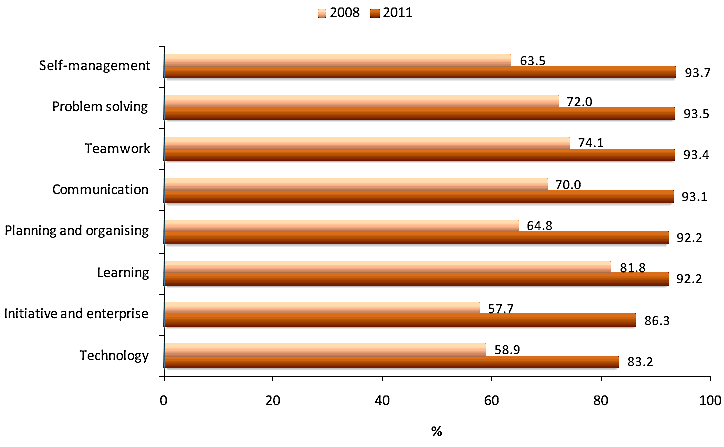|
|
|
|
|
|
|
News & Views item - April 2012 |
![]() The 2011 Report of the Beyond Graduation Survey. (April 5, 2012)
The 2011 Report of the Beyond Graduation Survey. (April 5, 2012)
David Carroll (Senior Research Associate) is the principal author of
the 18-page report
Beyond Graduation 2011![]() and the project director of the 2011 Beyond Graduation Survey.
and the project director of the 2011 Beyond Graduation Survey.
Summarising its findings the report states:
Graduate Destinations
At the time of the 2008 AGS, 79.0 per cent of male graduates and 70.7 per cent
of female graduates reported that they considered themselves to be available for
full-time employment—that is, in or seeking full-time employment (see Table 1).
By 2011, the proportion of male graduates available for full-time employment had
increased to 87.0 per cent, which mainly reflected a decrease in the number of
graduates in further full-time study. The proportion of female graduates
available for full-time employment increased to 76.8 per cent by 2011, which
again mainly reflected a large decrease in the number of graduates in further
study. Female graduates were consistently more likely than male graduates to be
undertaking further full-time study, to be in part-time employment with no
desire for full-time employment, or to be unavailable for further study or any
employment.
Of the graduates who were available for full-time employment, the proportion who
had secured full-time employment increased considerably in the first year after
course completion (see Table 2). At the time of the 2008 AGS, 83.9 per cent of
male graduates and 82.8 per cent of female graduates were in full-time
employment, and by 2009 this had increased to 91.2 per cent and 89.1 per cent
respectively. This was naturally accompanied by a general decline in the
proportion of graduates in the full-time labour market who were either in
part-time employment or were unemployed.
The chart below taken from Figure 3 of the report depicts the:
"self-rated employability skills, high/very high, bachelor graduates in full-time employment,
by broad field of education, 2008 and 2011 (%)"

With regard to the employment of bachelor degree graduates Phil Lewis, director of the Centre for Labour Market Research at the University of Canberra, told The Australian "There aren't jobs for scientists. Calls for more people to study science come from vested interest groups. If you want to be successful as a scientist, you would go to the US where there is huge demand."
In rebuttal, Australia's Chief Scientist, Professor Ian Chubb said: "I've spoken to employers who say because they don't need a physicist then they don't employ somebody with a BSc who might have done physics. Whereas what they would be employing with that person would be (someone with) highly refined skills who knows how to analyse data, look at and unpick evidence, put it back together again and then use and adapt it. [I'm not arguing for] a huge expansion in science graduates. I'm arguing for a change in the way we prepare people for university study, with an increased interest in the science subjects so they will have a range of options available to them when they go to university. You can have a great career with a science education -- you can stay in science but there is a host of people who are senior players in Australia's corporate world who actually started with a science degree."
However Professor Lewis claims that even with a PhD, employment prospects for scientists were limited in Australia, with the government and academia being the main employers, and in fact the two viewpoints of professors Chubb and Lewis are not contradictory when one looks to what Australia will require to remain a first world culture and economy comes the end of the resources boom.